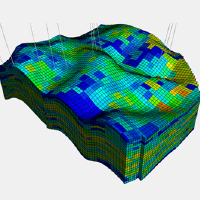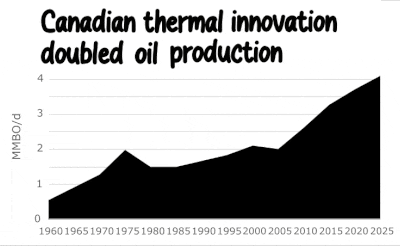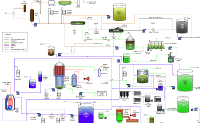Seven habits for highly effective [tight] floods
Evolution or revolution?
 Flooding sub 1 mD rock: overrated or underrated?
Flooding sub 1 mD rock: overrated or underrated?
If you are drilling in tight rock, you need AppIntel to find out how the floods of other operators are progressing. Without using AppIntel to review field installations, how will you know?
What patterns work? How does injectant behave in tight rock? Of what should you be aware before pushing water into your sub 1 mD rock? What are the differences from a regular flood?
?subject=Help me with tight flood best practices&body=Please help me with tight flood best practices. %0D%0A%0D%0AMy Name:__________ %0D%0AMy Phone Number:__________ %0D%0A%0D%0A(Or call Proven Sales at 403-803-2500.)">Contact Proven for support. We stay on top of best practices from applications.
One operator has put a lot of study into water flooding sub 1 mD rock. She looked at analogs. Special unsteady-state water-oil relative permeability lab tests were included as simulation inputs. She tested several patterns.
Her final simulated pattern arrangement indicates a 65% sweep efficiency.
Since this flood was proposed several years ago, you can see the actual field results of her tight flood pilot.
Help yourself to her application documents. You can get them in moments from our secure check-out.
Get details of this cool tech Subscribers get them for free5 things we can't do without AppIntel
Without AppIntel you can't find similar floods. Using AppIntel's search engine you can search for tight flood near 75-20W5 .
Without AppIntel you can't get application documents within moments -- you need to wait days for weeks for service from the AER.
Without AppIntel you can't search by UWI. Up to 30% of applications don't have UWI's. At Appintel we add them.
Without AppIntel you can't tell if there are any confidential documents associated with an application. How do you get confidential documents released if you don't know they exist?
Without AppIntel you won't get an email alert when someone submits an application within 20 miles of your operation. You won't get an email when someone submits an application with tight flood somewhere in the document.
Flooding extremely tight rock: evolution or revolution?
Real flooding is far more advanced and complicated than you learned in the text books. And the homogeneous bounded circular reservoir is very different from a sub 1 mD formation.
These types of floods are described more by their edge traits, not their average matrix. Their success is defined by their heterogeneity, not their homogeneity.
Averaging in nature - the internet quiz
Internet quizzes are very popular these days. Based on your answers, we'll tell you how much you weigh.
Quiz: If a home at the end of the block has 1 child, and a home at the other end of the block 10 children, how many children are in the home in the middle of the block?
- a) The middle home has 5 children.
- b) The middle home 5.5 children.
- c) The middle home might have some children.
- d) No idea.
If you answered a), you weigh double the weight of the average grade 5 child: 75 lbs.
If you answered b), you weigh the same as the average technical person downtown: 186.54 lbs.
If you answered c), you weight something -- more than 0 and less than 1 metric tonne.
If you answered d), congratulations, you weigh 15 lbs less than your bathroom scales said this morning.
?subject=Help me find all the tight flood discussions&body=Sign me up for a one day AppIntel trial so I can find all the tight flood discussions in application documents. %0D%0A%0D%0AMy Name:___%0D%0AMy Phone Number:___%0D%0A%0D%0APricing: https://www1.appintel.info/short-term-search/%0D%0A%0D%0A(Or call AppIntel Sales at 403-803-2500.)">Contact us now for a one day trial.
The seven habits for highly effective [tight] floods
The seven habits are a cross between Covey-esque self help algorithms and Proven's Optiflood process.
Habit 1. Plan for flood fluid success
Picking the injectant type and additives is very important. And ensure you source sufficient fluid.
Don't forget to check the fluid mobility.
Habit 2. Plan the patterns for heterogeneity
Ask yourself, which heterogeneity will control the injectant movement.
Which will control the reservoir fluid movement.
Habit 3. Balance the injection
Get the injectant to the right locations. Picking the injectant locations is only part of the puzzle. Foreseeing how the patterns work within a heterogeneous reservoir is tricky.
Getting the injectant to these locations is also very important.
Habit 4. Think like the reservoir
Try lying in the reservoir in your mind and visualizing how the potentials move you along.
Habit 5. Seek to understand the flood pressure performance
Ask yourself, where will the pressure increase? Which parts of the heterogeneous reservoir will be affected the most?
Habit 6. Add new ideas and strategies
After starting the flood, your job is far from over. The further along in the flood, you can become much smarter. Too many floods are abandoned without seeking to understand the reason for fluid break through -- without any remedial work.
Habit 7. Review and Improve
Manage the production water cuts carefully. Based on performance, where should infills be drilled? Where are new injectors needed?
Re-balance the injection -- move injection from watered out areas to high oil patterns.
?subject=I want an expert to help for the same price as an EIT&body=Tell me more about getting expert help for the same price as an EIT.%0D%0A%0D%0AMy Name_______%0D%0A%0D%0AMy Phone_______%0D%0Aor call Proven at 403 803 2500.">Contact Proven for expert work on the cheap.
Tags: Tight, Flood
 Granger Low 15 May 2017
Granger Low 15 May 2017

Experimental Propane Solvent co-injection in thermal
Continuing Canadian thermal innovation doubled oil production

Measuring the rate of oil and gas technology growth
Energy transition inside the oil industry

The rise of water recycle
Join or perish

AppIntel AI hit alerts
Ignite your insight

Blowdown and NCG injection
SIRs often reveal more than submissions

AppIntel AI contains much more than technical papers
More current. More coverage. More detail. More trusted.

New flood to double reserves for heavy oil pool
The age of water floods is not over

Flood repatterning
Extended life support

AI makes opportunity more accessible than conferences
Which sources of technical information do you trust?

Repairing microannulus in thermal wells
Check out the 4D seismic chamber thickness map

In-house AI attempts fail-80%
Spin off your in-house AI attempt

Facility fugitive emissions scrutiny
Keep your eye on the horizon of oil and gas change

AI predicts the future for 2026
using leading indicators

Celebrating 2025, a year of innovation
Oil and gas paradigm shifts this year




 Calgary, Alberta, Canada
Calgary, Alberta, Canada
 Share
Share